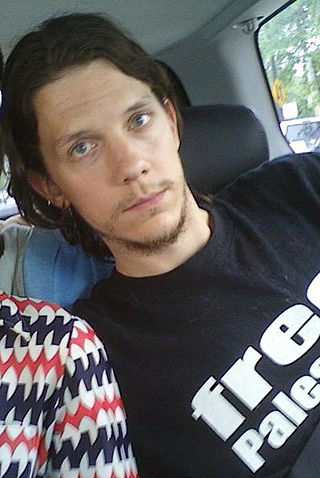Related Research Articles

Steve Jackson Games (SJGames) is a game company, founded in 1980 by Steve Jackson, that creates and publishes role-playing, board, and card games, and the gaming magazine Pyramid.

Phrack is an e-zine written by and for hackers, first published November 17, 1985. It had a wide circulation which included both hackers and computer security professionals.
.hack is a series of single-player action role-playing video games developed for the PlayStation 2 console by CyberConnect2 and published by Bandai. The four games, .hack//Infection, .hack//Mutation, .hack//Outbreak, and .hack//Quarantine, all feature a "game within a game", a fictional massively multiplayer online role-playing game (MMORPG) called The World which does not require the player to connect to the Internet. Players may transfer their characters and data between games in the series. Each game comes with an extra DVD containing an episode of .hack//Liminality, the accompanying original video animation (OVA) series which details fictional events that occur concurrently with the games.
Gray Areas was a quarterly magazine published from 1992 to 1995 by publisher Netta Gilboa. The magazine was based in Phoenix, Arizona. It won several awards including "One Of The Top Ten Magazines of 1992" by Library Journal. It discussed subcultures involving drugs (narcotics), phreaking, cyberpunk, pornography, the Grateful Dead and related issues. It only published 7 issues, but continues on as a website.
The Conscience of a Hacker is a short essay written on march 18, 1986 by Loyd Blankenship, a computer security hacker who went by the handle The Mentor, and belonged to the second-generation hacker group Legion of Doom.

Stewart Brand is an American project developer and writer, best known as the co-founder and editor of the Whole Earth Catalog. He has founded a number of organizations, including the WELL, the Global Business Network, and the Long Now Foundation. He is the author of several books, most recently Whole Earth Discipline: An Ecopragmatist Manifesto.

Uplink is a simulation video game released in 2001 by the British company Introversion Software. The player takes charge of a freelance computer hacker in a fictional futuristic 2010, and must break into foreign computers, complete contracts and purchase new hardware to hack into increasingly harder computer systems.

Maximum PC, formerly known as boot, is an American magazine and website published by Future US. It focuses on cutting-edge PC hardware, with an emphasis on product reviews, step-by-step tutorials, and in-depth technical briefs. Component coverage areas include CPUs, motherboards, core-logic chipsets, memory, videocards, mechanical hard drives, solid-state drives, optical drives, cases, component cooling, and anything else to do with recent tech news. Additional hardware coverage is directed at smartphones, tablet computers, cameras and other consumer electronic devices that interface with consumer PCs. Software coverage focuses on games, anti-virus suites, content-editing programs, and other consumer-level applications.
Hack-Tic was a Dutch hacker magazine published between 1989 and 1994. It had a cult following and upset authorities beyond the Dutch borders.

Your Sinclair, or YS as it was commonly abbreviated, was a commercially published and printed British computer magazine for the Sinclair range of computers, mainly the ZX Spectrum. It was in circulation between 1984 and 1993.
Neo-Luddism or new Luddism is a philosophy opposing many forms of modern technology. The term Luddite is generally used as a pejorative applied to people showing technophobic leanings. The name is based on the historical legacy of the English Luddites, who were active between 1811 and 1817. While the original Luddites were mostly concerned with the economic implications of improving technology in regard to industrialization, neo-Luddites tend to have a broader and more holistic distrust of technological improvement.

PC Pro is one of several computer magazines published monthly in the United Kingdom by Future plc. Its headquarters is in London. PC Pro also licenses individual articles for republication in various countries around the world - and some articles are translated into local languages. as of 2006, it claimed to be the biggest-selling monthly PC magazine in the UK.

David Blake, also known as StankDawg, is the founder of the hacking group Digital DawgPound (DDP) and a long-time member of the hacking community. He is known for being a regular presenter at multiple hacking conferences, but is best known as the creator of the "Binary Revolution" initiative, including being the founding host and producer of Binary Revolution Radio, a long-running weekly Internet radio show which ran 200 episodes from 2003 to 2007.
A security hacker or security researcher is someone who explores methods for breaching defenses and exploiting weaknesses in a computer system or network. Hackers may be motivated by a multitude of reasons, such as profit, protest, information gathering, challenge, recreation, or evaluation of a system weaknesses to assist in formulating defenses against potential hackers.
Richard Cory Kostelanetz is an American artist, author, and critic.
The Digital DawgPound is a group of hackers, best known for a series of articles in hacker magazines such as 2600: The Hacker Quarterly and Make, the long-running webcast Binary Revolution Radio, and a very active set of forums with posts from high-profile hackers such as Strom Carlson, decoder, Phiber Optik and StankDawg. The stated mission of the DDP is to propagate a more positive image of hackers than the negative mass media stereotype. The group welcomes new members who want to learn about hacking, and attempts to teach them more positive aspects and steer them away from the negative aspects, by reinforcing the hacker ethic. Their goal is to show that hackers can, and regularly do, make positive contributions not only to technology, but to society as a whole.

Goodiepal or Gæoudjiparl van den Dobbelsteen, whose given name is Parl Kristian Bjørn Vester, is a Danish/Faroese experimental electronic musician, performance artist, composer and lecturer, as well as a fully educated horologist. His work engages with the past, present, and future of computer music, compositional practices and resonance computing, and his idea of Radical Computer Music. His tours have included 150 universities internationally.

Jeremy Alexander Hammond, also known by his online moniker sup_g, is an American anarchist activist and former computer hacker from Chicago. He founded the computer security training website HackThisSite in 2003. He was first imprisoned over the Protest Warrior hack in 2005 and was later convicted of computer fraud in 2013 for hacking the private intelligence firm Stratfor and releasing data to WikiLeaks, and sentenced to 10 years in prison.
Body hacking is the application of the hacker ethic in pursuit of enhancement or change to the body's functions through technological means, such as do-it-yourself cybernetic devices or by introducing biochemicals.

A computer security conference is a convention for individuals involved in computer security. They generally serve as meeting places for system and network administrators, hackers, and computer security experts. Common activities at hacker conventions may include:
References
- ↑ this commercial Archived 2006-11-09 at the Wayback Machine .
- ↑ Epiphany - We Must Regain Our Freedom